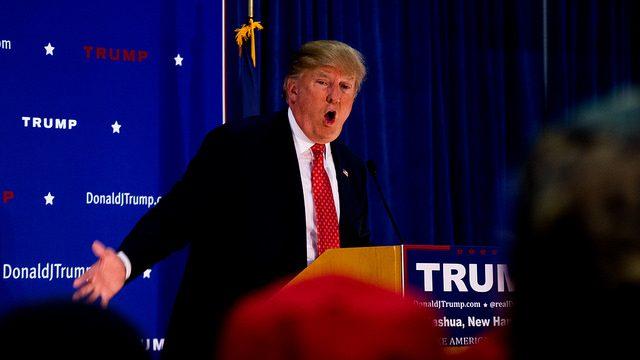
What are Donald Trump's true aspirations in his bid for the presidency? A new TV show with higher pay? Eternal fame with adoring fans?
Checkmark on that last one. Pundits have been expounding lately on what drives Trump – other than big “Mexican” taco bowls and an insatiable appetite for large crowds. What keeps him going late at night, knowing that large sectors of the Republican party have either written him off completely or are desperately trying to form an intervention to his election?
“Donald Trump never actually wanted to be president of the United States,” writes filmmaker and author Michael Moore. "Trump was unhappy with his deal as host and star of his hit NBC show, 'The Apprentice' (and 'The Celebrity Apprentice'). Simply put, he wanted more money." According to Moore, who said he has the information on good standing, the run for presidency was just a ruse that was supposed to last for a couple of months, nothing more. NBC, the network behind "The Apprentice," would be sure to see the merits of his celebrity status and offer gads more money.
Washington Post writer Greg Sargent takes things a step further. He says even duping American voters (and taxpayers' coffers that are covering some of the costs of his run) would seem banal for a man who thrives on trying to build the biggest skyscrapers and commanding a TV character whose prime line was, "You're fired!"
Sargent, who has written extensively on the Republican candidate, suggests that Trump's real intention all along was to establish an all-white following that would allow him to "pivot" his attention toward creating a media network supporting far, far right perspectives. And Sargent is not alone.
Just look at Trump's spending priorities, suggests New York Times writers Nicholas Confessore and Rachel Shorey, who point out that Trump's focus has been antithetical to a party win-all mentality.
Sargent expounds: "Trump is very consciously sinking most of his resources into a format (rallies) that allows him to continue staging his unique form of raucous WWE-style political entertainment, and building an audience that thrills to it, rather than winning a general election."
The candidate's recent hiring of Stephen Bannon, founder of Breitbart News Network as campaign chief suggests Trump is keenly aware of the genre of fans his rallies will to continue to attract: individuals who would benefit from and support more validation of views not considered generally acceptable in mainstream media. Bannon has been immensely successful at creating a go-to space for what he refers to as the "alt-right" (or "white supremacists"as one Breitbart insider also noted).
But not everyone seems convinced that Trump has an ulterior motive and is using the chaos of his campaign to build a mega-media status.
"[It’s] time we stopped assuming that Trump has something we could call a coherent strategy — or ever will," argues Washington Post writer Paul Waldman. "It’s increasingly apparent that both the man himself and his campaign have a competing pair of impulses."
In Walman's perspective, Trump's campaign chaos isn't a strategy toward achieving something grander than himself, but a reflection of his true inability to manage a presidential campaign.
Whatever theory you choose, the real takeaway may be what it means for the American political system.
"Trump could change the race by stamping his image upon the Republicans in a way they cannot escape. Trump has made himself the symbol of racism against Latinos in the United States," concludes Jonathan Chait, a writer for New York magazine. "He is absolute brand poison."
And while Democrats may want to call such conclusions the ice cream on the cake that they'll be ordering when Hillary Clinton wins the White House, it bodes problems for a country molded by a two-party system that has its origins in the founding of the republic and the culture of a nation. Irrespective of his motives of fame and fortune, it will likely be the legacy he leaves on how and why we choose to vote that will resonate the loudest after this election is over.
Image: Flickr/Marc Nozell
Jan Lee is a former news editor and award-winning editorial writer whose non-fiction and fiction have been published in the U.S., Canada, Mexico, the U.K. and Australia. Her articles and posts can be found on TriplePundit, JustMeans, and her blog, The Multicultural Jew, as well as other publications. She currently splits her residence between the city of Vancouver, British Columbia and the rural farmlands of Idaho.














